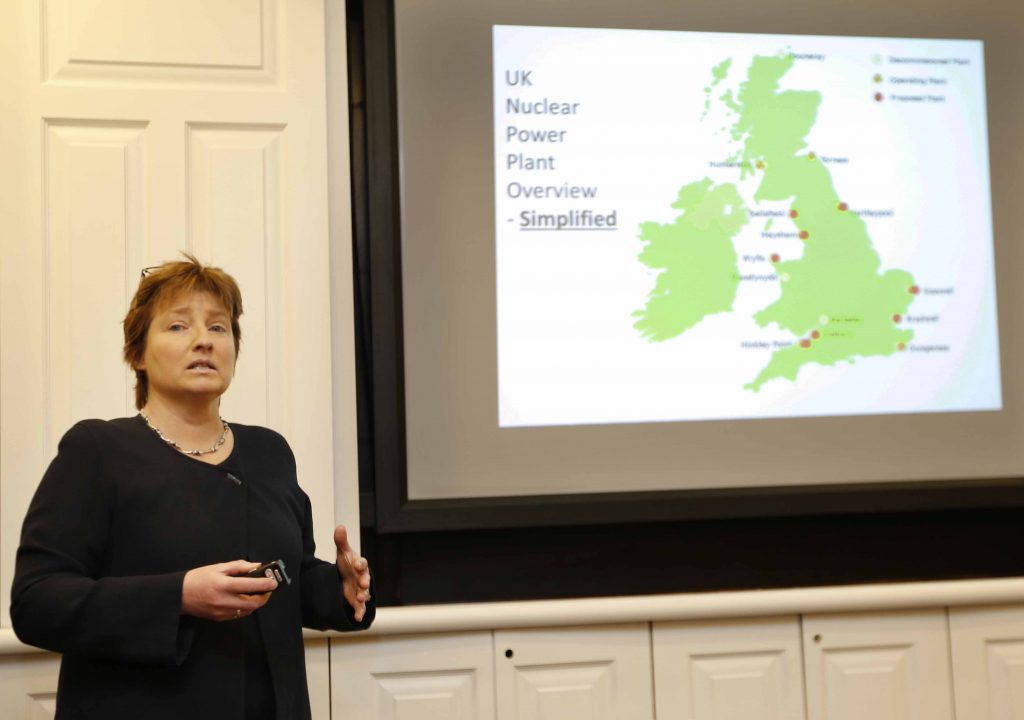State failing to consult citizens on UK’s proposed nuclear expansion, briefing hears

March 30th, 2018
The Irish State had made a serious lapse in judgement by failing to adequately consult with its citizens about the UK’s proposed nuclear expansion program, according to an environmental expert.
Speaking at a briefing at Buswells Hotel on Thursday, Attracta Ui Bhroin, the Environmental Law Implementation Group facilitator at the Irish Environmental Network said that it is important that the Irish people should have a voice on the UK’s plans.
The briefing was organised by the Environmental Pillar and co-convened by the leaders of the Green party, Labour party and Social democrats. Green Party Senator Grace O’Sullivan chaired the briefing.
According to Ms Ui Bhroin, the UK plans to build five of its eight proposed new nuclear plants on its west coast facing Ireland.
The UK is also debating the possibility of having an underground or undersea storage for radioactive waste in marine locations including potential locations in Northern Ireland, she said.
The extension of the operating lifetime of older nuclear plants is also on the cards, Ms Ui Bhroin added, with a number of public consultations undertaken by the UK Government recently on these issues.

Attracta Ui Bhroin, Environmental Law Implementation Group Photo: Sasko Lazarov/Photocall Ireland
She said, however, that the citizens of the Republic of Ireland have not been informed of these key consultations adding that the ongoing consultation about the proposed Hinkley Point C nuclear plant only came about after continued pressure from environmental NGOs.
A consultation on the Hinkley station, set to be located less than 250km from Rosslare, began recently after five years of legal battle fought by Irish environmental groups to uphold the rights of the Irish public, Ms Ui Bhroin added. The consultation is set to close on 17 April 2018.
“Our own ESRI produced a very important report that estimated that the worst-case scenario [from a nuclear accident] would amount to more than €160 billion in economic losses and that’s dwarfs the recent bank bailout.”
Ms Ui Bhroin also highlighted that Ireland’s ability to recover from such an event would be severely compromised with long term contamination of land and water.
Concerns were also raised about the lack of solutions as to how to deal with nuclear waste from UK facilities and flood risks at Hinkley by Irish climate expert, Professor John Sweeney.
“The UK Government themselves admit that the flood risk at Hinkley by 2080 is high. Their proposed solution is to build a wall around the outskirts of the station itself and the extent to which that is secure is something that the Irish public might want to have some say on,” he added.

Pictured are (LtoR) Patrick Kent, President of the Irish Cattle and Sheep Farmers’ Association, Attracta Uí Bhroin, Environmental Law Implementation Group, Eamon Ryan, TD, Green Party Leader, Green Party Senator Grace O’Sullivan and Dr John Sweeney, Emeritus Professor of Geography at the National University of Ireland Photo: Sasko Lazarov/Photocall Ireland
Patrick Kent, President of the Irish Cattle and Sheep Farmer’s Association ICSA said that any nuclear accident would “devastate agriculture for many years”.
He stressed that the recent snowstorms indicate how the vulnerability of the farmers and livestock and the practical problems faced when access to water is restricted.
“I think we have a right as a people to be consulted as to whether the plans that are being made for these power stations are robust enough and whether they address legitimate concerns that the Irish people might want to express,” he added.
[x_author title=”About the Author”]







